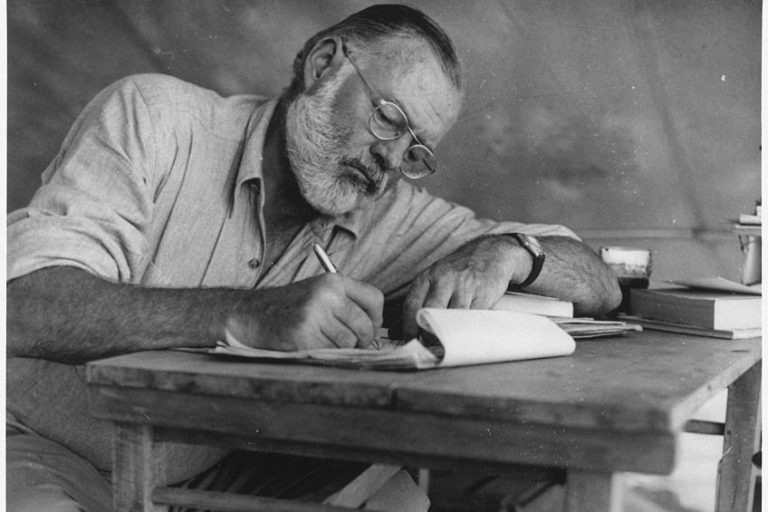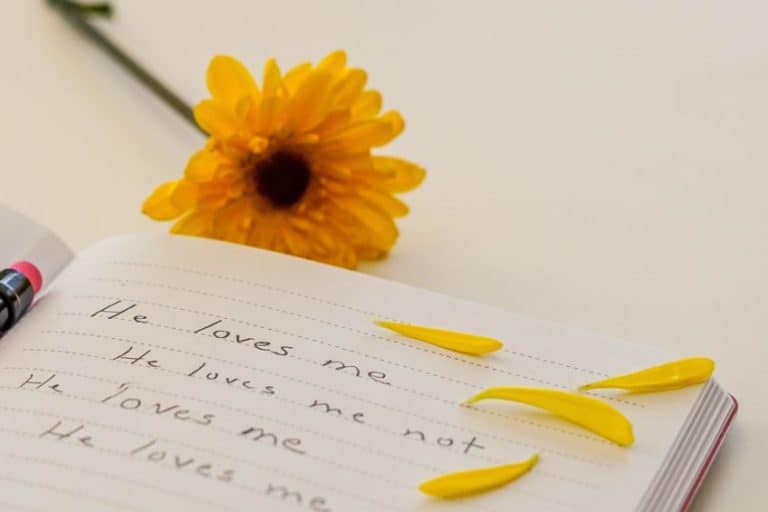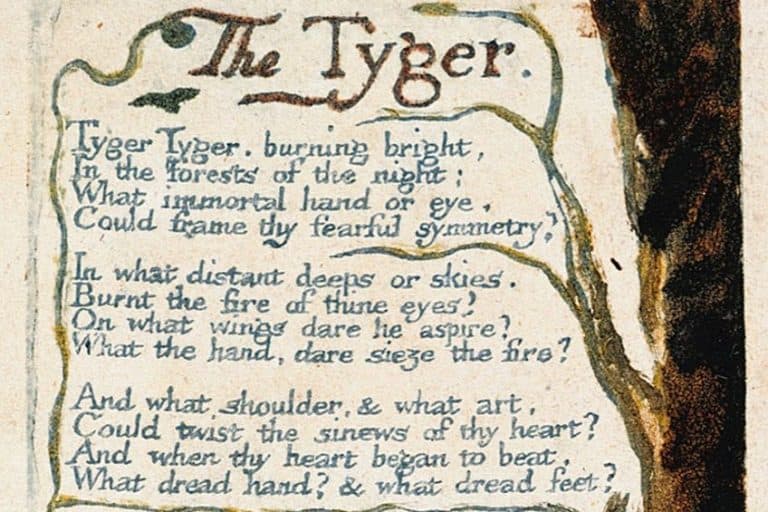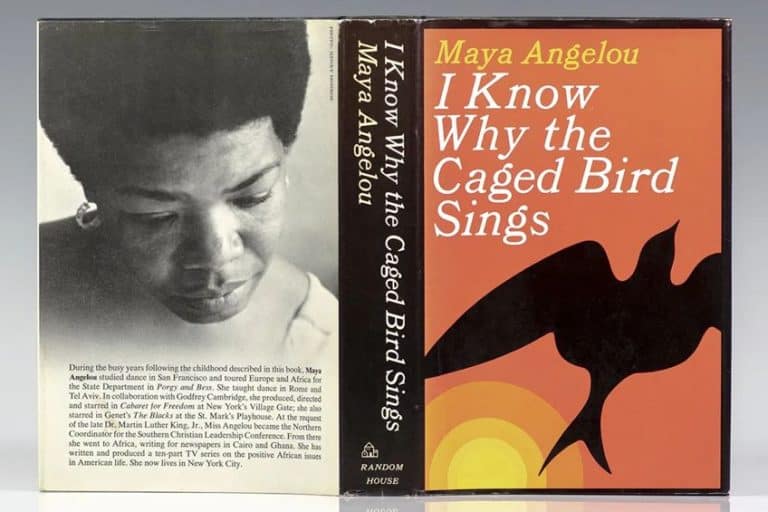What Is Spoken Word Poetry? – Everything You Need to Know
What is spoken word poetry? This article will examine the history of spoken word poetry, some of the primary aspects of the form, its existence as a return to the oral tradition, and a number of famous spoken word poems. This contemporary iteration of this poetic form is a fascinating and multifaceted medium that has only grown in recent decades. So, if this is something that interests you in any way, keep reading to learn more about spoken word poetry!
What Is Spoken Word Poetry?
The term “spoken word poetry” is an intentionally broad label. In basic terms, spoken word poetry refers to any kind of poetry that is performed in some or another way. The term originated in the late-20th century as a means to return to some of the origins of poetry as part of the oral tradition. The focus transitioned away from what is ordinarily focused on in many instances of poetry, namely how the words appear on a page, and is instead geared towards producing an engaging performance.
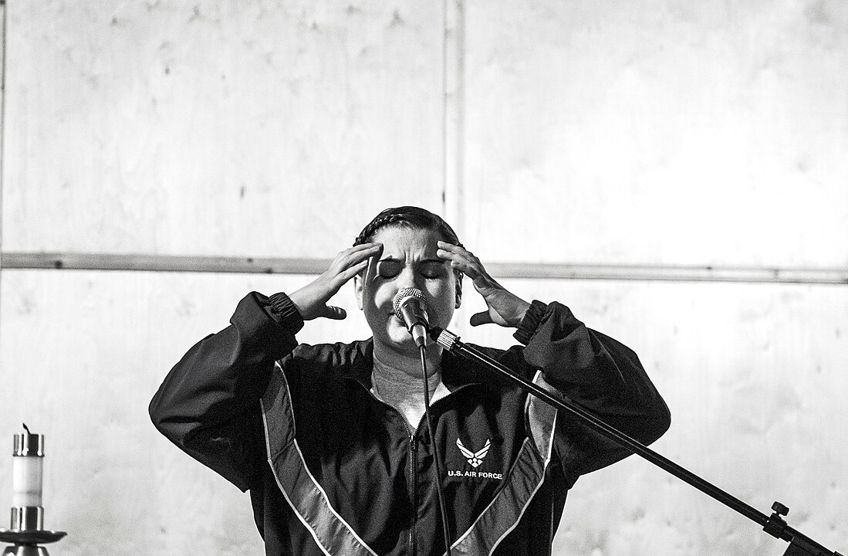 Airmen celebrate Black History Month through spoken word (2014); Senior Airman George Goslin, Public domain, via Wikimedia Commons
Airmen celebrate Black History Month through spoken word (2014); Senior Airman George Goslin, Public domain, via Wikimedia Commons
The term also exists as a catchall phrase, because spoken word poetry examples include any instances of poetry that is spoken aloud. This includes slam poetry, jazz poetry, ordinary poetry readings and recitals, some comedy routines (especially those that are meticulously prepared and implemented), and even certain musical styles that can be likened to spoken word, such as rap. Sound is often the most important aspect of spoken word poems, and these poems also cover a wide range of themes and styles, all of which will be discussed in the article below.
The main thing that needs to be understood is that spoken word poetry is comparatively young and that it has become a major influence on a number of contemporary musicians and poets, and the performance of poetry has become more common than ever because of this form.
The History of Spoken Word Poetry
Spoken word poetry has its origins in the ancient past, but that will be discussed in slightly more detail later in the article. Instead, it would be best to look at where spoken word poetry originated in the modern day. The more contemporary understanding of this form of poetry started in the mid-20th century during a number of different periods of time. These periods included the Beat Movement and the Black Arts Movement.
These kinds of movements in the 20th century were often means of reviving older forms, such as more traditional African cultural mediums during the Black Arts Movement and the later culture of hip-hop from the 1970s and 1980s. These movements often operated independently but also influenced one another and led to the resurgence of an interest in a more performance-oriented poetry style.
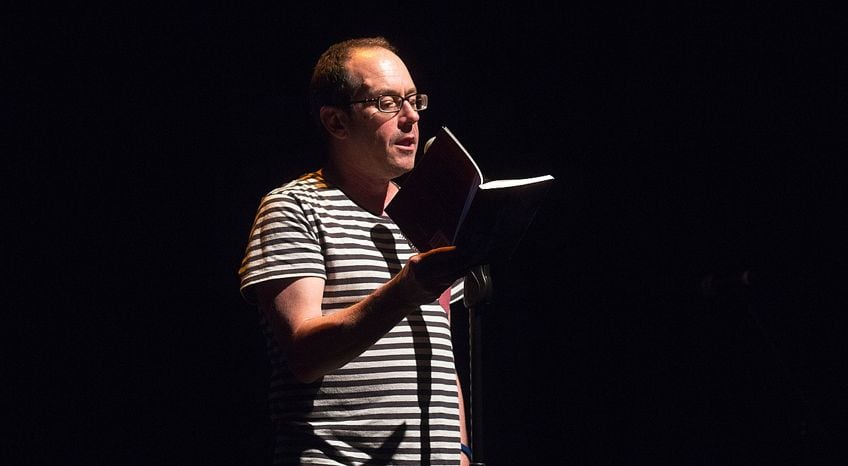
During the late-20th and early-21st centuries, a number of spoken word poetry events and ideas started to take form. For instance, slam poetry and open mic nights would become more prominent alongside albums being produced that were solely oriented around spoken word poetry. In the 21st century, the internet would play an ever-increasing role in this medium.
However, spoken word poetry reached its height in the 1990s and 2000s as it became more of a mainstream medium that was known to more people. This became more prominent through the various large events that focused on spoken word poetry, such as the National Poetry Slam and the Women of the World Poetry Slam. This has led to the mainstream acceptance of spoken word poetry as a medium that can be found around the world.
The Performance Aspect of Spoken Word Poetry
The principal idea behind spoken word poetry is that it is geared around performance. For this reason, if you want to know how to write a spoken word poem, you need to keep performance in mind. Most poems are geared around textual aspects, such as the use of typography. However, a poem that is intended to be performed needs to be quite different from that. Instead of focusing on the text, it needs to focus on the sound and the other performance aspects.
Sound is an important part of it, and so spoken word poetry often makes use of more phonetically pleasing effects, such as alliteration and rhyme, but it also makes use of heavy emotion and voice.
This can be achieved through the poet’s performance. They can inject an emotion into their voice when they speak and recite their poem. In addition, they can use gestures and facial expressions, or even play off the audience and pull them into the performance itself.
Common Elements of Spoken Word Poetry
Some of the most common elements of spoken word poetry, thanks to its existence as a performance-oriented medium, are usually oriented around phonetic excellence. This can mean the strong use of wordplay, intonation and emphasis, rhyme, repetition, rhetorical questions, and so on. These kinds of elements are especially suited to the performance of poetry.
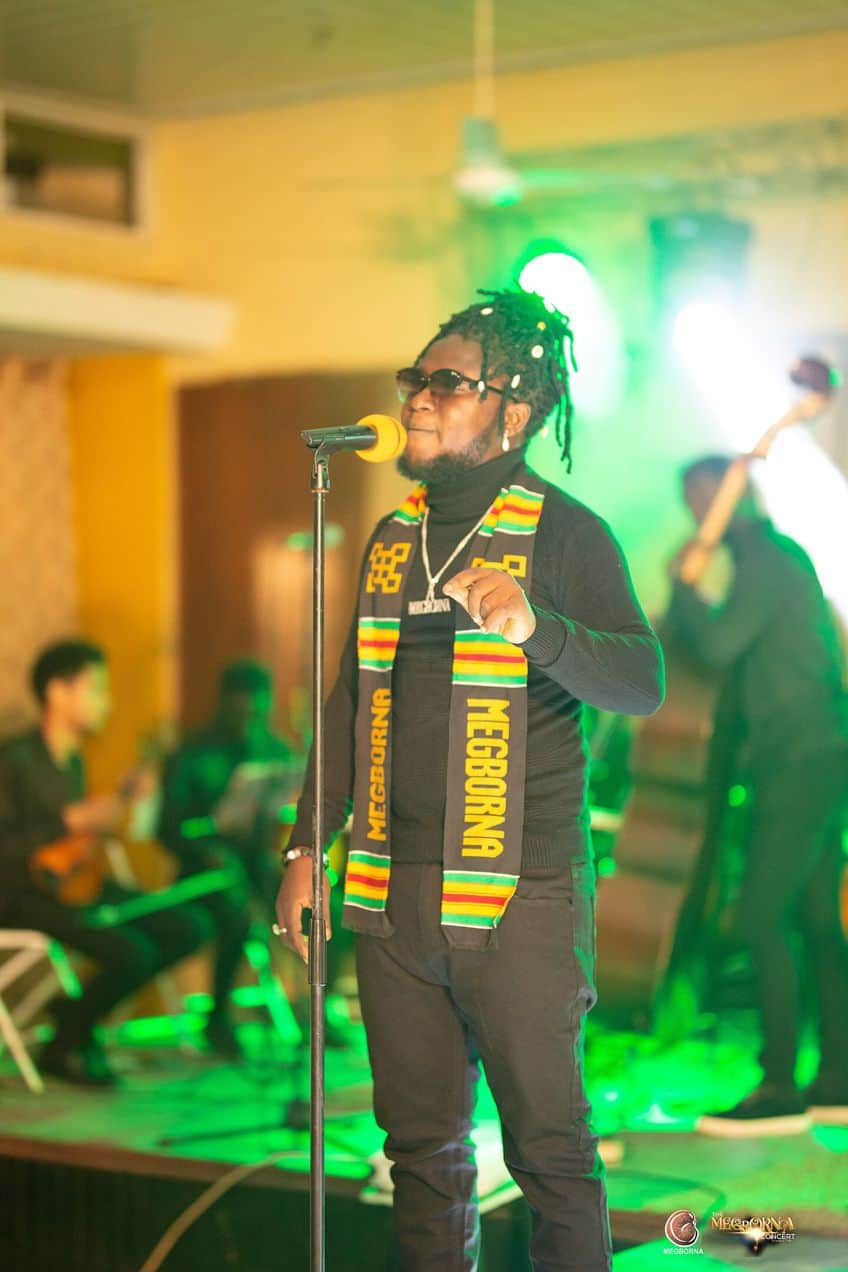
Common Themes Explored in Spoken Word Poetry
When it comes to the kinds of themes that spoken word poetry generally addresses, it is very common to see more social issues being taken into account. This can mean, race, gender, class, justice, politics, and so on. In addition to this, many spoken word poets make use of more personal responses and recount events from their own experiences.
Many spoken word poets are from marginalized groups, and this medium allows said poets to use their poetry as a medium through which they can relate their personal experiences to a far broader cultural context.
However, much like in regular poetry, there is no such thing as an “off-limit” topic, or at least not necessarily. A spoken word poem could be about something far more innocuous, such as love. And when it comes to how to write a spoken word poem, this should be taken into account. You can make use of more sweeping societal issues in the world or you can speak from personal experience.
Spoken Word Poetry as a Return to the Oral Tradition
Spoken word poetry can be seen as a return to the oral tradition. This term refers to a specific period of time in the existence of practically every culture before the existence of written forms of language. In the oldest cultures, poetry did exist. It often existed as a form of performance and would generally be accompanied by musical instruments. A pre-writing civilization still produced art, it simply couldn’t record all of that art.
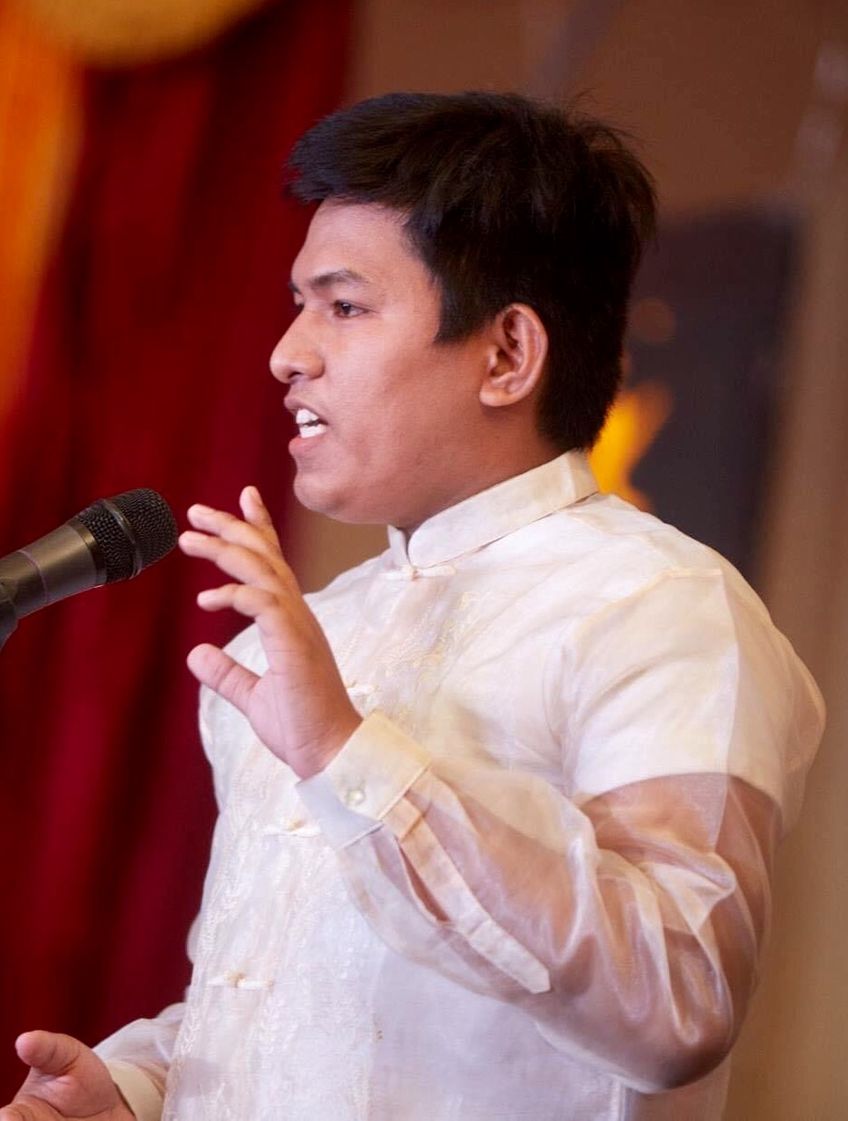 Julan Shirwod Nueva performing spoken word poetry (2020); Jsnueva1022, CC BY-SA 4.0, via Wikimedia Commons
Julan Shirwod Nueva performing spoken word poetry (2020); Jsnueva1022, CC BY-SA 4.0, via Wikimedia Commons
This is what spoken word poetry sometimes attempts to do. It wants to be a return to that pre-writing period in which poetry was based on recitation rather than reading. It restores an aspect of performance to the medium. While more performance-light versions of spoken word poetry do exist, such as in standard recitations, this is not as known as the more energetic variety, especially as seen in slam poetry.
Poetry can be read, but it can also be a communal performance meant to invigorate a crowd and to make them think. This may be some of the earliest origins of poetry, but it was lost after the invention of writing systems. Performances have always existed, but they shifted away from poetry and more towards music and drama.
Spoken word poetry allows there to be a reform of this idea.
Spoken Word Poetry Examples
There are a number of famous spoken word poems, but we will only examine two of them today. As spoken word poetry is such a broad label, these two examples of famous spoken word poems will be quite different from one another in tone and structure. So, let’s have a look at these two spoken-word poetry examples.
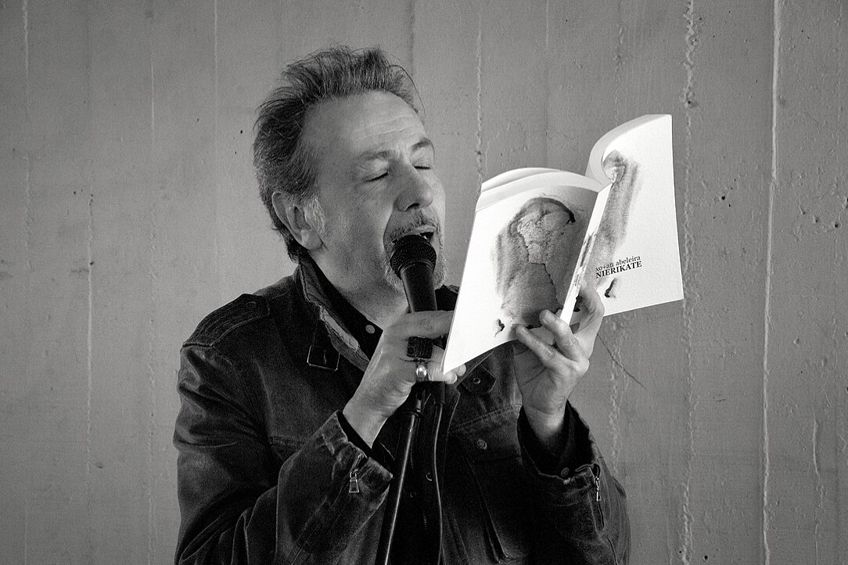 Xoán Abeleira Reciting Spoken Word (2017); Xoan Abeleira, CC BY-SA 4.0, via Wikimedia Commons
Xoán Abeleira Reciting Spoken Word (2017); Xoan Abeleira, CC BY-SA 4.0, via Wikimedia Commons
Storm (2008) by Tim Minchin
| Date Published | 2008 |
| Type of Poem | Spoken word |
| Rhyme Scheme | AABBCC (some variation) |
| Meter | Tetrameter (some variation) |
| Topic | Critique of anti-science rhetoric |
Tim Minchin is not particularly associated with poetry and is more associated with comedy music. His work is humorous and technically well-delivered, and when it comes to this particular example of spoken word poetry, it eschews the usual more pretentious angles of poetry that many tend to associate with poetry in general.
Instead, this poem is presented along more comedic lines while also serving as a strong cultural critique of certain ways of thinking.
The poem makes use of a variable rhyme scheme and a strong tetrameter rhythm while focusing on a criticism of an anti-science mentality. The poem is structured as an argument between Minchin and a woman named Storm. Their argument is about science, religion, the supernatural, and so on. The humorous use of a heated and hyperbolic debate between these two contrasting figures is entertaining and quite unlike what one generally thinks of as poetry of any description.
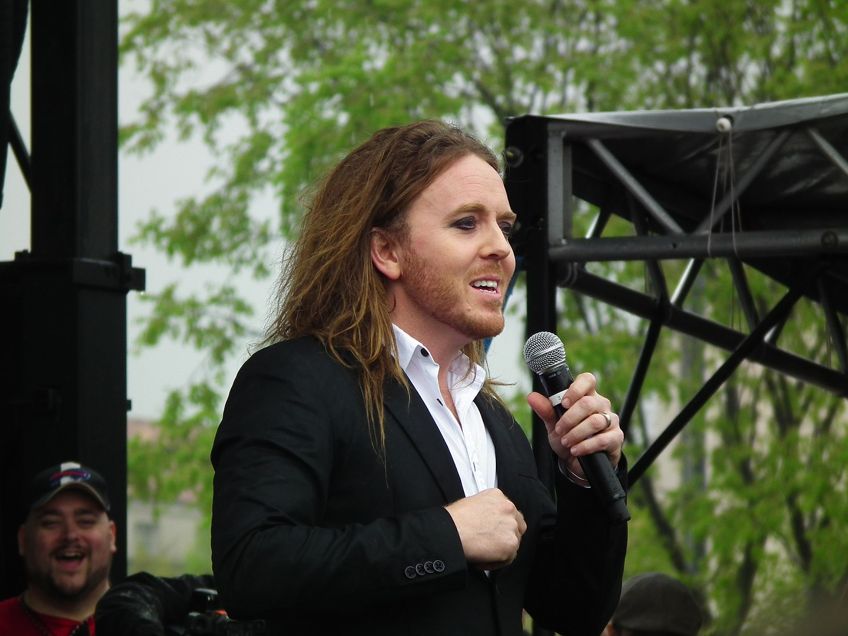 Tim Minchin at the Reason Rally (2012); S Pakhrin from DC, USA, CC BY 2.0, via Wikimedia Commons
Tim Minchin at the Reason Rally (2012); S Pakhrin from DC, USA, CC BY 2.0, via Wikimedia Commons
Everybody Dies but Not Everybody Lives (2016) by Prince EA
| Date Published | 2016 |
| Type of Poem | Spoken word |
| Rhyme Scheme | None |
| Meter | None |
| Topic | Living a fulfilling life |
Prince EA is considered to be one of the greatest contemporary spoken word poets currently producing work, and this particular spoken word poem has become one of his most famous examples of this form. The poem is concerned with the idea of empowerment of everyday people to try to live their lives in an authentic and fulfilling manner. The motivational aspect behind the poem is intended to serve as a means of encouraging those who listen to the poem to take these messages to heart and to, hopefully, learn that they too must try to live their life.
The poem itself is made up of a number of different poetic devices, such as anaphora, antithesis, and a questioning layout. The constant contrast between those who truly live and those who simply exist is a constant feature and thematic throughline of the poem as a whole. The poem uses these techniques to reflectively examine the challenges that we face in life and it encourages the listener to pay attention to their own values and aspirations and to not simply leave them behind.
And with that, we come to the close of our look at the question: “What is spoken word poetry?”. Over the course of this article, we have examined a number of different aspects of spoken word poetry. We have discussed the history of the form, some of the major aspects of it, a few spoken word poetry examples, and a few points here and there about how to write a spoken word poem. Hopefully, you have learned a good deal about spoken word poetry today, and maybe try and listen to some spoken word poetry the next time you have a chance.
Frequently Asked Questions
What Is Spoken Word Poetry?
Spoken word poetry is a catchall term that refers to any kind of poetry that is, in some way, performed aloud. This means that it has a stronger focus on the phonetics, or sounds, of a poem rather than what it looks like on a page. There are many different types of performances that have their roots in spoken word poetry, such as slam poetry, jazz poetry, and many others.
When Did Spoken Word Poetry Originate?
In terms of the ancient origins of spoken word poetry, it would have originated in places such as ancient Greece where it was part of the standard way in which poetry was presented. Performance was always integral to the form. However, the contemporary version of spoken word poetry originated in the mid-20th century in the Beat Movement and during the Black Arts Movement.
What Are the Main Features of Spoken Word Poetry?
The main point that is made in spoken word poetry is that it cannot be focused on the image of a poem. When reading a poem, there are various elements that can be taken into account that are based on its existence as something on a page. When it comes to a poem that is performed aloud, it needs to make use of sound-oriented devices and techniques to emphasize the performance aspect of spoken word poetry.
Who Are the Most Famous Spoken Word Poets?
There are various spoken word poets in the world and they all hail from different places and make use of a number of different styles. Some of the most famous include figures like Prince EA, Lebo Mashile, Andrea Gibson, and many others. Defining a spoken word poet can also be complicated, as various artistic and performance-based mediums can be considered examples of spoken word poetry, such as rap music, and the most famous rapper may be quite different from a traditional spoken word poet.
What Are the Most Famous Spoken Word Poems?
Some of the most famous spoken word poems include works such as Everybody Dies but Not Everybody Lives by Prince EA and Still I Rise by Maya Angelou. Many of the most famous spoken word poems are often about social issues and for this reason, many of the most famous examples of this form tend to be highly impactful and confrontational in their general approach.
Justin van Huyssteen is a freelance writer, novelist, and academic originally from Cape Town, South Africa. At present, he has a bachelor’s degree in English and literary theory and an honor’s degree in literary theory. He is currently working towards his master’s degree in literary theory with a focus on animal studies, critical theory, and semiotics within literature. As a novelist and freelancer, he often writes under the pen name L.C. Lupus.
Justin’s preferred literary movements include modern and postmodern literature with literary fiction and genre fiction like sci-fi, post-apocalyptic, and horror being of particular interest. His academia extends to his interest in prose and narratology. He enjoys analyzing a variety of mediums through a literary lens, such as graphic novels, film, and video games.
Justin is working for artincontext.org as an author and content writer since 2022. He is responsible for all blog posts about architecture, literature and poetry.
Learn more about Justin van Huyssteen and the Art in Context Team.
Cite this Article
Justin, van Huyssteen, “What Is Spoken Word Poetry? – Everything You Need to Know.” Art in Context. September 8, 2023. URL: https://artincontext.org/what-is-spoken-word-poetry/
van Huyssteen, J. (2023, 8 September). What Is Spoken Word Poetry? – Everything You Need to Know. Art in Context. https://artincontext.org/what-is-spoken-word-poetry/
van Huyssteen, Justin. “What Is Spoken Word Poetry? – Everything You Need to Know.” Art in Context, September 8, 2023. https://artincontext.org/what-is-spoken-word-poetry/.



